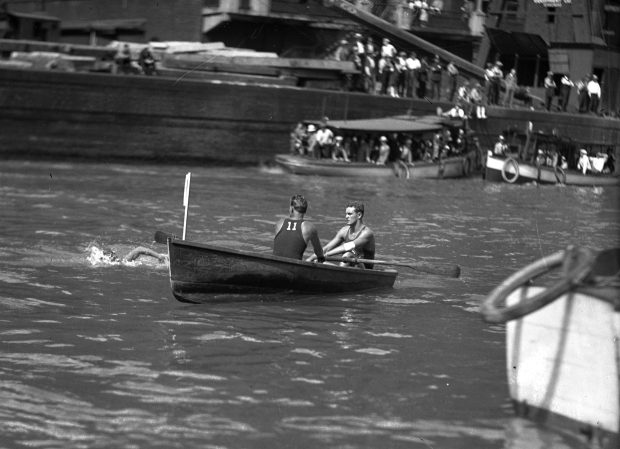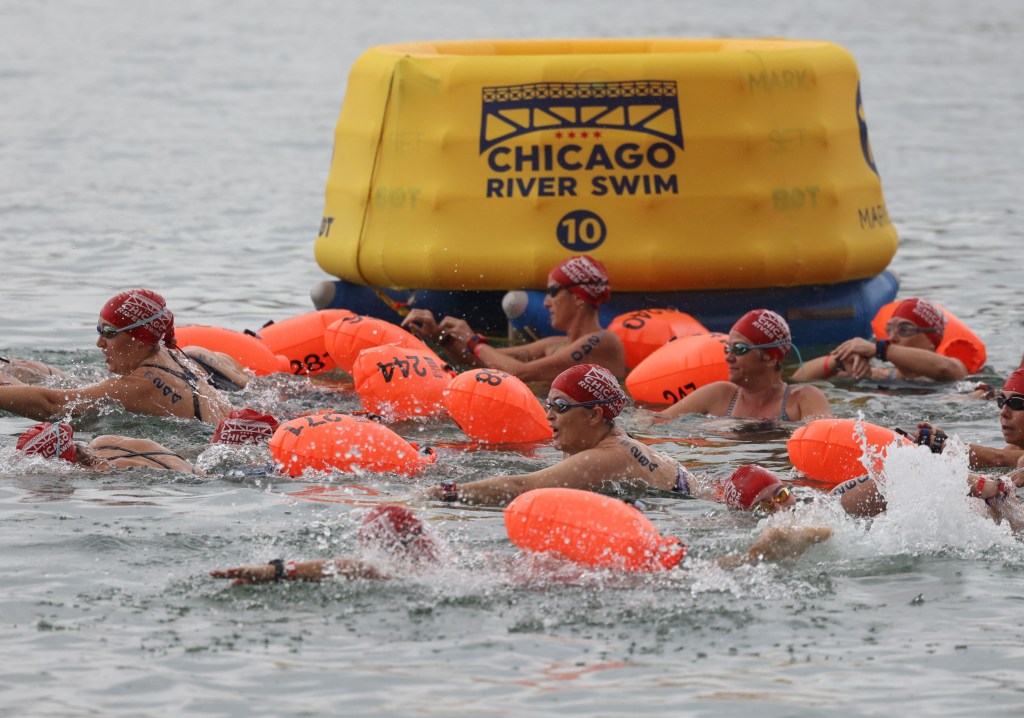Before hundreds of swimmers are set to jump into the Chicago River in September, organizers and advocates say they are taking a “victory lap” of their own.
On Thursday, the city of Chicago approved the first official open-water swim to take place in its urban waterway in almost a century. A city spokesperson said the permit process was still in progress. This comes after 13 years of planning, and after last year’s event had to be relocated to Lake Michigan when, just two months out, transportation officials denied a permit citing safety concerns.
“This is, really, a long time coming,” said Doug McConnell, organizer of the Chicago River Swim and founder of A Long Swim, an area nonprofit that will produce the event to fund Northwestern University research for ALS, a fatal neurological disorder known also as Lou Gehrig’s disease. “It’s been a lot of pick-and-shovel, hard work, and people really dedicated to a common goal and outcome.”
To address safety, organizers said they will deploy over 100 safety personnel — with 40 lifeguards, or one for every seven swimmers — to monitor the course on kayaks, paddleboards, jet skis, rowboats and power boats. Participants will also wear an electronic GPS chip on their ankles and autonomous buoys so that organizers can account for their position on the course, which the U.S. Coast Guard will close to vessels. Riverwalk access will also be limited to specific areas.
On Sept. 21, from 7 to 10 a.m., 500 Olympic, triathlon and open-water swimmers from around the world will participate in either a 1-mile or 2-mile race that will kick off at the Dearborn Street Bridge and head east to State Street, then back west to Lake Street. The finish line will be near the Clark Street Bridge.
“Our goal is to have the swim started, completed, done, wrapped up and everything by the time the commercial day starts on the river,” McConnell said. “The tour boats and the architecture boats and the kayaks and all the rest — we don’t want to be in their way.”
Applications for the swim are open to the public at chicagoriverswim.org until Monday at 10 p.m. There is no fee to apply, but prior experience as an open-water swimmer, Olympian or triathlete is required. Those selected to participate will be notified of their acceptance.
The day of the race, spectators will be able to watch and follow along from the Chicago Riverwalk between Lake and Clark streets, where vendors will offer refreshments. Tickets will also soon be available for purchase for an official VIP viewing party.
Like last year, the event will raise money to pay for swim lessons for kids in underserved local communities. And this time, advocates say, it will also be an opportunity to celebrate the river’s bounce back from murky and polluted to inviting, swimmable waters that teem with aquatic life.
“Now is the time to fly that banner,” McConnell said.
 Swim race contestant Johnny Weissmuller swims in the river while being closely followed by Lincoln Park life guard Pete Weissmuller in 1926. (Chicago Herald and Examiner)
Swim race contestant Johnny Weissmuller swims in the river while being closely followed by Lincoln Park life guard Pete Weissmuller in 1926. (Chicago Herald and Examiner)
The river is the cleanest it has been in a long time, especially since the Clean Water Act of the early 1970s and since the Environmental Protection Agency declared the river safe for swimming in 2011.
“So this, really, is the natural next step for what’s right for Chicago, what’s right for the Chicago River, and what’s right for the people who live here,” said Margaret Frisbie, executive director of advocacy nonprofit Friends of the Chicago River.
Today, the waterway is home to a thriving economy and restored wildlife, including migratory birds, beavers and turtles, as well as almost 70 species of fish — up from fewer than 10 in the 1970s.
“A lot of them are native fish, and I like to talk about how the native fish are pretty picky about what they enjoy, from a water quality standpoint,” said Austin Happel, research biologist at the Shedd Aquarium. “Seeing a ton of native fish really speaks to the increase in health of the ecosystem.”
While most of his work focuses on studying wildlife — specifically fish and how they move and behave in the Chicago River — Happel also gets to hear from people and learn how they interact with the environment.
“All of these recreational activities are bringing people to a natural resource,” he said, “and the more attention and the more people that use that natural resource, the more capacity we have and the ability to fight, to protect and restore it.”
Organizers will still keep a close eye on bacteria levels in the river — another main focus of swimmer safety. Besides real-time water quality monitoring that the Metropolitan Water Reclamation District of Greater Chicago and local water innovation hub Current already carry out in the main branch of the river, scientists from the University of Illinois Chicago will test the water for bacteria levels every day for three weeks leading up to the event, McConnell said.
In the news release, organizers said they are committed to allowing swimmers in the river “only if it meets all safety standards for human contact.”
“Data collected in the lead-up to the event will guide the final call, and the team is prepared to postpone or cancel the swim if necessary,” according to the statement.
In Chicago, heavy rains can cause overflows in its sewer system, with pipes that carry both stormwater runoff and sewage, releasing fecal matter into local waterways. Rains can also transport contaminated sediment from industry and even dog poop, which also has fecal coliform — the bacteria found in waste from warm-blooded animals.
Drinking or coming into contact with elevated levels of fecal coliform may cause an upset stomach, vomiting, fever or diarrhea in people. It can also cause serious conditions or death in vulnerable populations such as children, older people and immunocompromised individuals.
Some of these concerns about bacteria have recently played out on an international stage. Last July, the open-swimming competitions of the Paris Olympics were held in the iconic Seine River after initial contention and canceled test runs due to water quality concerns. After competing, many of the athletes experienced symptoms like nausea, vomiting, diarrhea and stomach cramps.
But water quality readings in the Chicago and Calumet rivers last summer showed that conditions remained good or low-caution for recreational users on 78 of 101 days, according to a Current report released in May. The other 23 days last summer had high caution readings that lasted anywhere from one to 24 hours, only four of those corresponding with sewer overflows.
Last month, three new swimming sites opened on the Paris riverbank for locals and tourists after a $1.5 billion cleanup project. Taking a dip there had been illegal since 1923 due to pollution and river navigation.
“I think there’s a global surge in interest in swimmable urban rivers,” said Alaina Harkness, CEO of Current. “To have Chicago front and center, bringing a river swim back — it’s just such an important way for us to showcase all the investment over decades (in) making our river safe to swim.”
President Donald Trump promises clean water. His proposed budget guts needed protections.
Frisbie, from Friends of the Chicago River, said in a Thursday news release that swimming in the waterway is about more than just recreation.
“This is opening the door to a whole new way of using the Chicago River,” she told the Tribune.
In the statement, she said hosting the historic event “demonstrates to the city, the region and the world that Chicago cares about its people, the environment and its water resources and that Chicago is a leader in recognizing the considerable role our rivers can play in public health and a climate resilient future.”
This year, the event will host 2020 Olympian Natalie Hinds of USA Swimming, who earned a bronze medal in Tokyo. As an athlete ambassador for the team’s foundation, she said she feels aligned with the event’s mission to raise money and fund swimming lessons for children whose families cannot afford them.
“I care deeply about water safety, broadening access to swimming, and preventing drownings through community outreach and education,” Hinds said in the news release. “Partnering with an event that champions local learn‑to‑swim programs in Chicago is both inspiring and deeply meaningful to me.”
Black and Hispanic people are less likely to know how to swim than any other racial or ethnic groups in the United States. Experts have found that even a few lessons can significantly decrease the risk of drowning, McConnell said.
“The return of the Chicago River Swim marks a major victory for our city — a testament to decades of hard work revitalizing our river,” Chicago Mayor Brandon Johnson said in the news release. “I commend the organizers for their commitment to safety and dedication to empowering Black and Brown youth through swim education. This event is a celebration of Chicago’s progress and a brighter, more inclusive future.”
Originally Published: August 7, 2025 at 3:47 PM CDT
